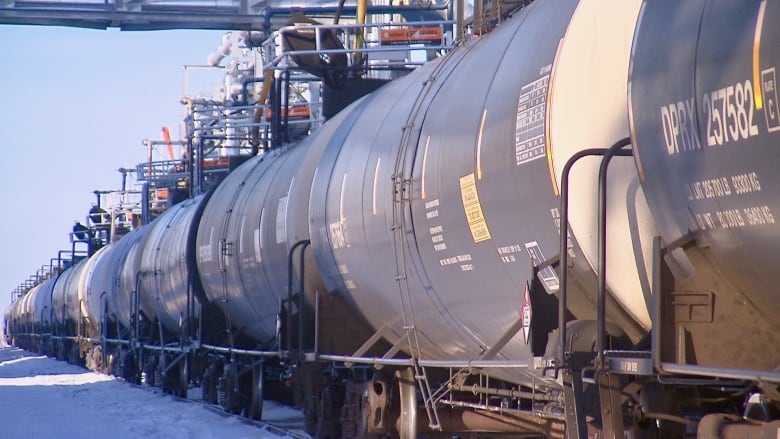Alberta eases oil curtailment for operators who ship extra barrels by rail
The announcement comes as the province works to cancel the previous government's crude-by-rail contracts

The Alberta government is creating a loophole for oil producers to circumvent oil curtailment limits which weredesigned to reduce transport bottlenecks.
Operators will be allowed to exceed their provincially-imposed output caps if they can ship those extra barrels by rail, Energy Minister Sonya Savage announced in a news release Thursday.
Alberta oil producers are currently shipping 310,000 barrels per day by railbut the system can handle 500,000 to 600,000 barrels a day by rail.
Many producers are capable of producing more than their curtailment limits allow and the exemption will help them cope with ongoing pipeline capacity constraints, Savage said.
"This program will enable curtailed operators to use all of that available rail capacity, resulting in a modest increase in oil production," Savage said during a news conference at the Alberta legislature.
The special production allowance takes effect in December. Savage described the policy as a "short-term approach."
Industry approached government officials with the proposal to ship more crude by rail in exchange for curtailment relief.
Savage said the province will work with operators to set the special production allowance baseline for individual companies. The baseline will be set at the operator's average rail shipment in the first quarter of 2019, the province said.
The allowance will be provided through a monthlyapplication process. Operators will have to provide proof they have rail contracts to transportthe additional oil. They will have to provide bills of lading after the fact to show the extra capacity was used.
The current differential, which shows the difference in price between a barrel of Alberta's Western Canadian Select crude and the baseline price of West Texas Intermediate, is around $16.25 US a barrel.
Savage doesn't expect Thursday's announcement will narrow the differential. She said the new initiative seeks to match production with shipping capacity.
Ending crude-by-rail contracts
Ben Brunnen, vice-president of oilsands and fiscal policy with the Canadian Association of Petroleum Producers, said his member organizations support the government's move.
He said the lack of shipping capacity has stymied industry's ability to invest in Alberta, so Savage's announcement will send an important message to markets.
"That then allows our companies to go back to their investors and their shareholders and say, 'Look, we can invest and we can grow in Alberta,'" Brunnen said. "And the returns can get there because we know that we can we can get that market access."
The announcement comes as the province works to cancel the previous NDP government's s $3.7-billion crude-by-rail contract and divest those contracts to the private sector.
The opposition criticized the decision to cancel those contracts, saying they would have brought about an end to curtailment this year, as originally promised.
The crude-by-rail contract, had it not been cancelled, would have added an estimated 120,000 barrels per day in takeaway capacity and generated $2.2 billion in revenue, according to the NDP.
- Alberta extends oil curtailment for another year
- Continued oil production curtailment dampens energy sector investment, report says
Alberta introduced a curtailment policy last year as a supply glut, created by transportation constraints anddepressed Canadian oil prices.
The policy was implemented by the previous NDP government as the price gap between the western Canadian heavy crude and U.S. light oil ballooned to more than $40 US a barrel in late 2018, ravaging companies' bottom lines and provincial revenues.
The province and industry players have said the root of the problem is an inability to export Canadian oil as regulatory and legal challenges bog down new pipeline projects.
Curtailment was supposed to be in place until the end of this year. But the province decided to extend it by a year, in large part because Enbridge's Line 3 Replacement project to the U.S. Midwest, which would add 370,000 barrels of daily export capacity, is being held up by permitting issues and legal wrangling in Minnesota.
The province has been gradually easing its limits since imposing an initial 3.56 million barrel a day cap in January. September's levels were set at 3.76 million barrels a day, with October's set to rise to 3.79 million barrels.
In August, the newly-elected UCP government increased the oil curtailment limit from 10,000 to 20,000 barrels per producer per day, and extended the program to December 2020 and reduced the number of impacted companies from 29 to 16.
Before curtailment, companies in the province could produce more than four million barrels a day during the strongest months.
Savage has said thatwithout the production limitsthere would be 150,000 more barrels produced daily than could be exported.
With files from The Canadian Press and the CBC's Michelle Bellefontaine












_(720p).jpg)


 OFFICIAL HD MUSIC VIDEO.jpg)
.jpg)



























































































